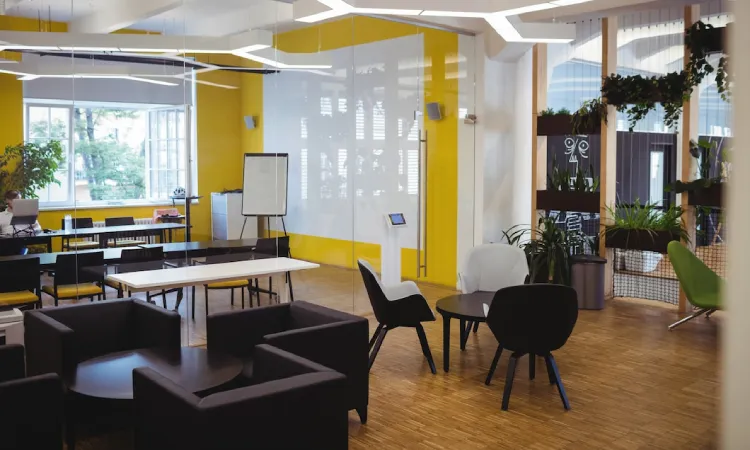Commercial Interior Design in Delhi
- Home
- Commercial Interior

Commercial interior Design in Delhi Build With Engineers
Commercial interior design in Delhi, like in many other vibrant and cosmopolitan cities, plays a pivotal role in creating dynamic, functional, and aesthetically pleasing spaces for businesses to thrive. Delhi’s commercial spaces range from corporate offices and retail stores to restaurants, hotels, and coworking spaces. Each of these sectors demands a unique approach to interior design to cater to their specific needs and goals. Here’s an overview of commercial interior design in Delhi:
Corporate Offices:
Corporate interior design in Delhi focuses on creating efficient and productive workspaces that reflect a company’s brand and culture. Key considerations include:
-
Open Workspaces: Many modern offices in Delhi opt for open-plan layouts to encourage collaboration and flexibility. Designers focus on creating ergonomic workstations and collaborative zones.
-
Branding and Identity: Interior designers integrate a company’s branding elements into the office design through color schemes, logos, and graphics.
-
Sustainability: There’s a growing emphasis on eco-friendly and sustainable design practices. Incorporating energy-efficient lighting, recycled materials, and greenery is common.
-
Wellness: Wellness-focused design elements, such as biophilic design (connecting with nature), are incorporated to enhance employee well-being.
Retail Stores:
Retail interior design in Delhi aims to create immersive shopping experiences and drive sales. Key considerations include:
-
Store Layout: Designers optimize the layout to guide customers through the store and maximize product exposure. Attention is given to creating attractive window displays.
-
Lighting: Proper lighting, both natural and artificial, is crucial to highlight products and set the desired mood.
-
Visual Merchandising: Visual merchandising principles are applied to showcase products effectively and entice shoppers.
-
Customer Flow: The store’s layout is designed to encourage a smooth and intuitive customer flow, minimizing congestion.
-
Aesthetics: The interior design aligns with the brand’s image and target demographic. The choice of materials, colors, and textures is essential.
Restaurants and Cafes:
The restaurant and cafe interior design in Delhi is diverse, reflecting a range of culinary experiences. Key considerations include:
-
Ambiance: Creating the right ambiance for the target audience is crucial. Delhi boasts a wide variety of dining options, from traditional to contemporary, and designers tailor the interior accordingly.
-
Seating: The choice of seating, whether it’s traditional floor seating, comfortable sofas, or classic dining chairs, impacts the overall dining experience.
-
Lighting: The right lighting can transform a restaurant’s mood. Romantic, lively, or cozy atmospheres are achieved through lighting design.
-
Kitchen Visibility: Open kitchen designs, allowing diners to see chefs at work, are gaining popularity in Delhi’s dining scene.
-
Local Culture: Some restaurants draw inspiration from Delhi’s rich cultural heritage, incorporating traditional elements into their modern designs.
Hotels:
Hotel interior design in Delhi combines luxury and functionality to create a comfortable and memorable stay. Key considerations include:
-
Guest Experience: Designers focus on providing a seamless and enjoyable guest experience, from the lobby to the rooms.
-
Thematic Design: Themed hotels, such as heritage properties or boutique hotels, are common in Delhi. Interior design plays a vital role in reinforcing the chosen theme.
-
Hospitality Areas: Public spaces like lobbies, restaurants, and lounges are designed to be inviting and functional, catering to both tourists and business travelers.
-
Comfort: Guestroom design prioritizes comfort, ensuring that guests have a restful stay.
-
Local Art and Culture: Many hotels in Delhi incorporate local art, crafts, and cultural elements into their design to offer an authentic experience.
Coworking Spaces:
As the demand for coworking spaces grows in Delhi, interior designers focus on creating flexible and inspiring work environments. Key considerations include:
-
Flexibility: Coworking spaces are designed to accommodate diverse work styles and preferences, from open workstations to private offices.
-
Community Areas: Common areas are designed to foster interaction and collaboration among members.
-
Amenities: Coworking spaces often include amenities like cafes, lounges, and fitness centers, which are integrated into the overall design.
-
Technology: Designers ensure that the latest technology infrastructure is in place to support remote work and connectivity.
Delhi’s commercial interior design scene is vibrant and dynamic, catering to a diverse clientele. Whether it’s creating innovative office spaces, retail experiences, dining destinations, or coworking hubs, interior designers in Delhi are at the forefront of transforming spaces to meet the evolving needs and preferences of businesses and customers alike.
Spectacular Interiors
Accuntuate Vision
Affordable Works
Proper Decorations
